2018 Was the Year Resale Went Mainstream
As conversations around sustainability reached a fever pitch, the resale market has exploded.
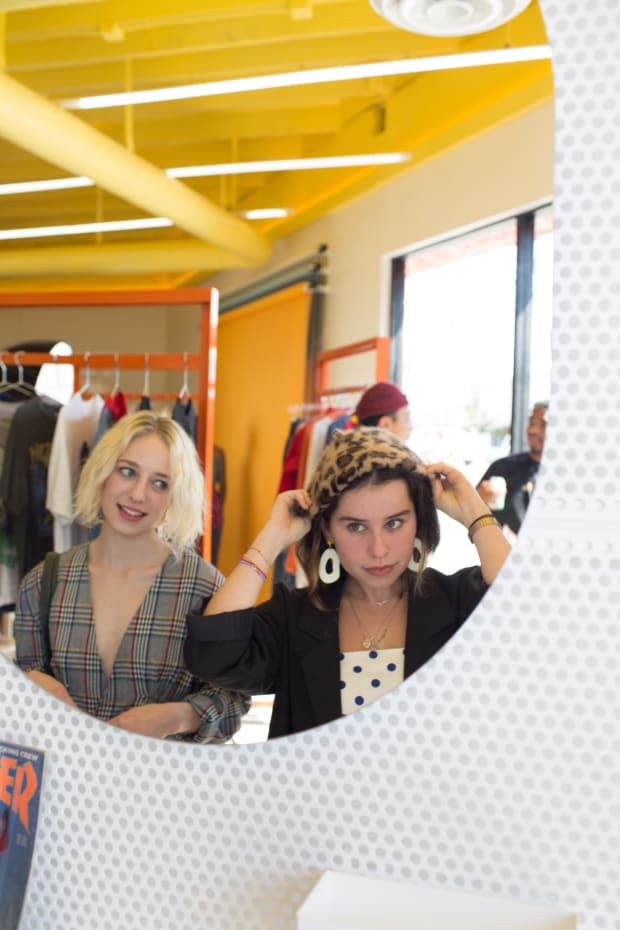
It’s been a long 12 months, and before we kick 2018 to the curb, we're looking back at all of the most memorable, game-changing fashion and beauty things that went down. Follow along with us as we look back at the year in review.
One of the topics that we're actually pleased to report dominated the fashion conversation in 2018 was sustainability: From Burberry burning its excess inventory to a plethora of luxury brands banning fur to brands like Reformation and Everlane getting more transparent and vocal about circularity, a number of headlines and factors converged to help consumers become significantly more aware of the harm fashion consumption does to the planet, and the available methods of curbing it.
It's no coincidence that 2018 was also a huge year for resale sites like The RealReal, Thredup, Rebag, Depop and Vestiaire, as well as those in the men's sneaker/streetwear space like Grailed and StockX. And thanks to the subtle variations in their business models, they've all been able to compete with one another by staying in their unique lanes.
This was the year resale was projected to overtake fast fashion within a decade. Gradually, the conversation around circularity became normal — almost ubiquitous — erasing much of the stigma consignment may have had just a few years ago. Meanwhile, as more brands used hype and scarcity to sell their goods, more consumers found reselling opportunities. In other words, it was the year resale went mainstream.
After years spent raising millions (and millions) of dollars in venture capital and acquiring sellers and buyers, these digital-first companies spent the past year putting that money to good use.
The RealReal, for instance, opened a 12,000-square-foot space on Melrose Avenue in Los Angeles this summer to complement its New York location. "We have seen that store experience has introduced a huge audience of people that had never consigned before," says Rati Levesque, the company's chief merchant. "It's proven an excellent way for those who aren't quite comfortable shopping online for higher-value items to come in and touch and feel the product, try it on, and engage with one of our company experts in a personal, one-on-one setting." With its sleek, airy layout and in-store cafe, the Melrose location feels more like a luxury department store than a consignment shop, and that seems to be a big part of how these companies are differentiating their brick-and-mortar concepts from the secondhand stores that have existed in all cities for decades.
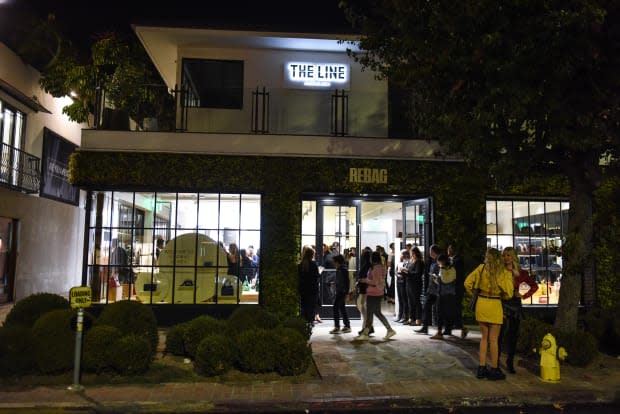
"Part of what we're trying to do is remove the dust, or the negative biases, on the resale industry," says Charles Gorra, founder and CEO of Rebag, a luxury handbag reseller which began online but opened five stores in the past year — three in New York and two in Los Angeles; one of them is located on the prime shopping stretch of Melrose Place, adjacent to brands like The Row, Oscar de la Renta and Isabel Marant, in a space formerly occupied by Anya Hindmarch. He says many customers come in and don't even realize the inventory is all pre-owned because the store is merchandised like a high-end boutique.
"A big goal in opening stores has been to de-stigmatize online thrift and reinvent the thrift store," echoes Sam Blumenthal, Thredup's marketing and communications manager. Meanwhile Depop, which does not have a consignment model and instead allows users to sell items directly to each other through an app, unveiled an entirely different (and Gen-Z-friendly) approach to brick and mortar: Its locations in New York and Los Angeles act as community gathering spaces which hold events, seminars, and services. Three days a week, the LA space operates as a creative studio that users can book for photo shoots for their shops.
In addition to opening physical locations, a big push for many of these companies was brand collaborations. While brands, particularly those in the luxury space, tended to be resistant to the idea of resale (since they don't get any of the profits when one of their items sells on The RealReal), they began to warm up to the idea in 2018. That's thanks in part to sustainability pioneer Stella McCartney: Late in 2017, in one of her many efforts to keep clothing out of landfills, she became the first big proponent of reselling in the luxury space by partnering with The RealReal to encourage her customers to resell her designs when they're done wearing them, giving them $100 in credit at her stores in return. In 2018, their partnership really took shape, and paid off. The RealReal consignors of Stella McCartney items increased by 65 percent this year, while the number of Stella McCartney items consigned increased by 74 percent. The two brands recently announced that the partnership will extend through 2019.
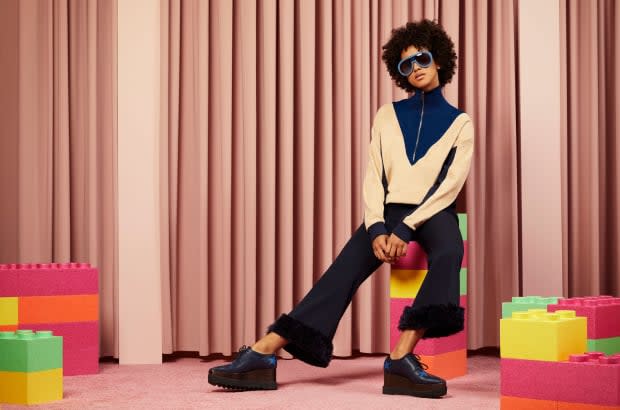
"Moving from reducing our negative environmental impact to making a positive impact requires all of us to change our mindset and leverage solutions that will make fashion circular and eliminate waste," said McCartney in a statement. "The partnership with The RealReal created an easy and impactful solution for our customers to participate in a circular economy."
On the more accessible end of the brand spectrum, Thredup launched similar partnerships with Reformation and Cuyana this year as part of a new program called Upcycle, through which Thredup powers recycling programs for retailers. The brands' shoppers receive a special Thredup recycling kit and can receive a credit towards that brand for sending in used clothes — of any brand. Blumenthal says the Reformation partnership has already diverted tens of thousands of pieces of clothing from landfills. Thredup plans to add 10 more brand partners, ranging from big-box retailers to direct-to-consumer labels, in 2019.
"We've had retailers approach us wanting to know how they stack up against other brands as far as their resale value and demand for their used product," she says. "Retailers are realizing that secondhand is the future of their business and consumers are demanding a more ethical, sustainable option."
The RealReal also argues that such partnerships inspire consumer confidence in brands, as they offer proof that the brands' items have decent resale value. "We are having more conversations with brands now regarding partnerships as they are increasingly warming up to the idea of resale because they see how it supports the primary market," notes Levesque.
Reformation also launched its own Depop shop on Earth Day to sell gently used items. When Depop opened its New York space, it tapped buzzy downtown designer Sandy Liang to create a collection of upcycled vintage pieces that sold out in an hour. It also hosted a denim collaboration with influential vintage shop Procell. Both its New York and LA spaces often hold pop-up events for emerging brands.
Thredup also expanded its offering beyond secondhand this year with a new, data-driven in-house line called Remade of pieces that are designed to last and ultimately be resold back to Thredup. "It's a test to understand if consumers are more likely to buy product that is designed to be resold, not thrown away," says Blumenthal. "Our ultimate goal is zero-waste where all the materials are reused and all garments come with a buyback promise."
This year, The RealReal also launched its sustainability calculator, a tool that quantifies the positive impact of consignment on the planet, which consumers will soon be able to use to calculate the environmental impact of their own consignments.
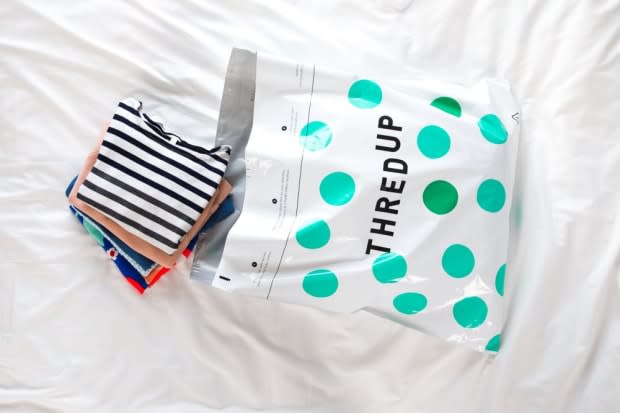
While the practice of buying and selling used clothing has always inherently had a sustainable effect, the environmental benefits of resale have become a much bigger part of the conversation and messaging over the past year, perhaps outweighing the financial benefits that may have drawn in customers initially.
"Consignment is a driver of the circular economy and consumers are now realizing that buying well-made items in the primary market offers them not only great resale value, but the satisfaction of extending the life cycle of that item and avoiding the landfill," says Levesque. "It has never been about jumping on the sustainability bandwagon because it's buzzy or that consumers are gravitating towards more sustainable brands. Our goal is to raise public awareness of the issues with fast fashion and we are now seeing conscious consumers take a considered approach to how they shop."
"I think there's really been a rise in the more conscious consumer, and people are not just shopping secondhand because they have to; they're shopping secondhand because they want to," says Blumenthal. "I think we've realized the importance of speaking out about the things that matter to us as a company, one of those being reducing textile waste and addressing the issue of overproduction."
In July, Thredup shared an open letter to Burberry condemning the luxury brand's practice of burning unsold products, which had recently been made public. "Today we invite you to send any unsold Burberry product to Thredup for resale back into the circular economy, and we'll donate 100 percent of the proceeds to the environmental charity of your choice," it read.
The timely letter garnered lots of attention for Thredup. "On social media, the response was really overwhelming," says Blumenthal. "We saw more people returning to the site who had maybe visited once or more new customers who were intrigued about that narrative and realized that shopping secondhand is actually really good for the planet."
As more people warm up to the idea of resale, these sites are continuing to bring in new buyers and sellers, with no signs of slowdown. The resale market, now worth $20 billion, is expected to more than double in size in the next four years, after all. According to Blumenthal, one in 10 women in the United States are already members of Thredup and the site process 100,000 items per day on average and puts 1,000 items online per hour. Depop's user base has grown from 8 million to 12 million in the past year alone.
In addition to serving a growing cohort of so-called conscious consumers, these sites align with a growing shift in how people shop and think about their wardrobes. Fashion fans are increasingly thinking about luxury purchases in the same way sneakerheads have been thinking about sneaker purchases for some time: with resale value in mind. "Consignors are making purchases now knowing they will eventually consign and make a large portion back on the original cost — it's more of an investment mindset," says Levesque. "Additionally, we're seeing consumers, more and more, shopping retail who want to know the resale value of designers and items before they make a purchase. We often get people calling us because they're looking to decide between items."
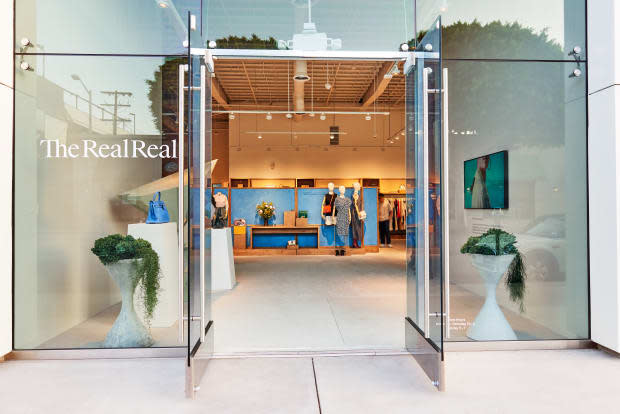
Our unwavering collective obsession with nostalgia also probably hasn't hurt: Many shoppers turned to the secondhand market to buy into trends like fanny packs, biker shorts and logo handbags this year.
People also feel less of a need to own something forever, and less weird about wearing something someone else wore before them. "I do think that the rise of the sharing economy has also helped – it's taken the stigma out of resale and removed the need to own something forever," says Levesque.
Rebag's Gorra, who previously worked at Rent the Runway, also feels this. It recently launched Rebag Infinity, where you can purchase a bag with the guarantee that within six months, Rebag will buy it back for at least 70 percent of what you paid for it, which you can use on the next bag. For shoppers looking to buy into a trend or with a social media-driven need for a constantly revolving wardrobe, it's a useful service.
"I think the stigma around shopping secondhand is pretty much gone," says Blumenthal. "We think 2018 was the year that secondhand truly went mainstream and 2019 is going to see this rise of a more conscious consumer."
While mindsets have certainly changed, there's still a long way to go. "If you look at the available pool of luxury supply and people who are actually reselling this, it's not even 10 percent. Really, 90 percent of the supply is still dormant somewhere, and we think it's gonna take years, maybe even decades, until what's sort of a niche behavior becomes a mainstream behavior," explains Gorra. "Our expectation is that, if you fast forward 10, 15 years, essentially this is going to become the standard." To that end, Rebag and most of the companies mentioned here work with influencers in some capacity to promote the benefits of resale and share their scores.
As for what's next for 2019, the companies we spoke with were focused on beefing up their in-store capabilities and brand partnerships. Thredup is currently exploring department store pop-ups "to see how we can introduce secondhand products alongside the new products that they already carry," says Blumenthal. The RealReal plans to open more stores and e-commerce centers.
"I see the future of resale continuing its rapid growth trajectory," says Levesque. "In many ways, we've only just begun."
Never miss the latest fashion industry news. Sign up for the Fashionista daily newsletter.
